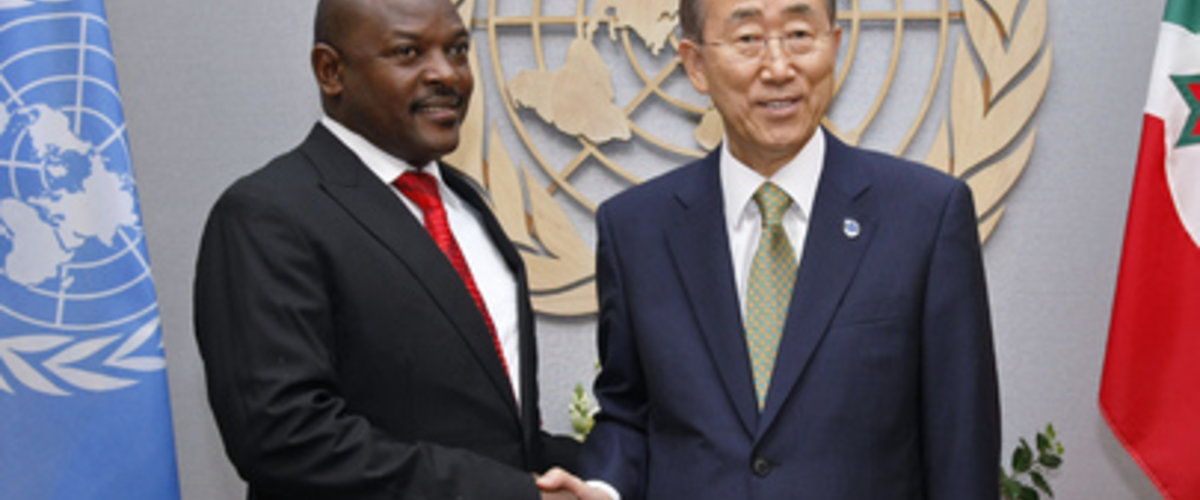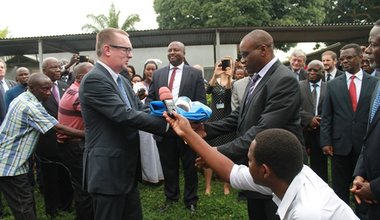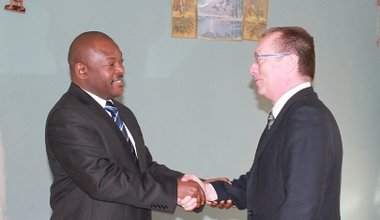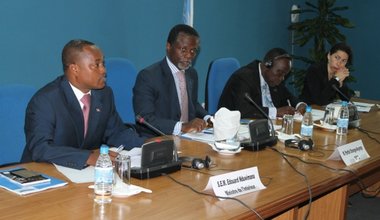Secretary-General’s report says that Burundi continued to make progress in consolidating peace
24 January 2013 - Despite political challenges and concerns about human rights, Burundi has continued to make progress in peace consolidation, security and stability as well as improving human rights situation, the United Nations Secretary-General's report states.
"It is incumbent on both the opposition and Government to play their part in ensuring a continuing consensual approach to peace consolidation", Ban Ki-moon says in his report today discussed at the Security Council with the Special Representative of the Secretary-General Parfait Onanga-Anyanga briefing the Members on the latest developments in the country.
"I am encouraged by the signs of improvement in the human rights situation in 2012 compared with the preceding two years. The number of extrajudicial executions appears to be declining. There must, however, be intensified efforts to ensure that all human rights violations are seriously investigated and that suspects are arrested and tried", he added.
The report however stresses that "2012 has witnessed a troubling diminishing of political space and of the spirit of consensus that has animated the peace consolidation process since the Arusha Accords. Burundi's long-term stability - and more immediately, the successful conduct of the 2015 elections - will hinge on maintaining both."
With the electoral process just two years away, the Secretary-General "calls on all to intensify efforts to resume dialogue and normalize relations and to ensure that the foundations are laid now for a peaceful and participatory campaign period" and stresses the need for the UN and international political engagement. "The United Nations will continue to provide its good offices with a view to creating an enabling and more inclusive environment so that the 2015 elections contribute to the further enhancing of democracy and the rule of law."
The report also calls for the need for Burundi to "protect its freedom of expression, association and political action, freedoms that are the bedrock of a thriving democracy" as "some recently adopted laws and draft laws currently being reviewed in Parliament – such as the status of the opposition, of civil society, and of the media - have been controversial."
Ban Ki-moon also branded the Geneva Conference of Development Partners held in October 2012 as an opportunity to present a "new Burundi" and "its success shows the willingness of international partners to invest in that vision".
The report also stresses that the conduct of a transitional justice process that meets Arusha Peace Accords twin objectives of reconciliation and justice is still outstanding and commended the Government for its continued commitment to passing the new law on a Truth and Reconciliation Commission. "The draft as it currently stands seems to show an inclination by lawmakers to put a greater emphasis on reconciliation, a major requirement for long-lasting peace and stability in Burundi. However, without justice and strong political will to end impunity, reconciliation alone will not help overcome the profound divisions that have pulled apart the people of Burundi in the past. All stakeholders must strive to ensure that the Truth and Reconciliation Commission is established, conforms to international and national expectations and is seen as independent, legitimate and credible in the eyes of all Burundians."
The Secretary-General's report emphasizes the Commissioners selection process, particularly Commissioners capacity to overcome divisions of any kind, and reiterated the United Nations availability to continue accompanying Burundi in its journey towards transitional justice. "BNUB (UN Office in Burundi) and OHCHR (Office of the High Commissioner for Human Rights) stand ready to provide support to a Truth and Reconciliation Commission that fully
meets these principles and aspirations", Ban Ki-moon says as he calls for a comprehensive and transparent campaign to promote a culture of peace as a basis for a more in-depth reconciliation process.
Regarding BNUB's future, Ban Ki-moon calls upon the Government of Burundi to accelerate efforts to reach the benchmarks so that the transition from the UN political office can begin as soon as possible as he recommends that mission's mandate extension for a year. He informed that a strategic assessment mission on the future of United Nations engagement in Burundi will be deployed to the country in the course of 2013, reminding that the goal remains "a shift from BNUB to a regular United Nations country team presence as quickly as conditions allow".
 UN
UN





